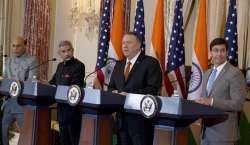2+2 dialogue between India, US ahead of US Election conveys a lot about bilateral ties: Report
The 2+2 dialogue between India and the United States was held just a week before the presidential elections in the US and this conveys a lot about where bilateral ties between both the countries are heading.

The 2+2 dialogue between India and the United States was held just a week before the presidential elections in the US and this conveys a lot about where bilateral ties between both the countries are heading. According to a Europe-based think tank, there is bipartisan recognition in the US of the need to counter Chinese belligerence and the 2+2 dialogue reflects the confidence that India and US have in the robustness of their relationship.
European Foundation For South Asian Studies (EFSAS), in a commentary, said the timing of third India-US 2+2 talks convey a lot about where the relationship between the two countries stands at the moment and the trajectory in which it is heading.
"There is little doubt that over the last two decades India-US ties have improved steadily, but the fact that the 2+2 dialogue was held just a week before the 3 November elections in the US in which there is little certainty over which of the two candidates would emerge victorious reflects the confidence that both sides have in the robustness of the core of the relationship," EFSAS said.
The report said that "it is also a fact that bipartisan recognition in the US of the need to counter Chinese belligerence, and India physically experiencing over the last six months the brunt of Chinese expansionism, have played an important part in the meeting being held at this juncture. Without the commonality and the immediacy of the Chinese threat, the US would in all likelihood have deferred the meeting to after the elections."
It also said that the in-person meeting between the two countries "amid pandemic is illustrative of the importance that both sides attach to the furtherance of their bilateral relationship."
According to the report, the Chinese response to the 2+2 dialogue revealed its acute discomfort over the closer alignment being forged between India and the US. Soon after the meeting, Chinese Foreign Ministry spokesperson Wang Wenbin during a press briefing asked the US to "stop hyping up the so-called 'China threat', and stop the misguided efforts to sow discord between regional countries".
The spokesperson added that "the Indo-Pacific strategy proposed by the US is preaching outdated Cold War mentality and...confrontation and geopolitical game".
The Chinese retort comes as a result of five key agreements signed during the 2+2 India-US ministerial-level dialogue including Basic Exchange and Cooperation Agreement (BECA), which will allow India real-time access to precision data and topographical images from the United States military satellites.
During the dialogue, the ministers of the two countries reaffirmed their commitment to deepening bilateral defence consultation and collaboration and to exploring opportunities to expand cooperative capacity-building efforts with partners across the region.
According to the EFSAS, the signing of the BECA has paved the way for India to acquire armed drones like Reapers or Predators from the US for long-range precision strikes against hostile targets on land and sea.
"The agreement on cooperation in counter-terrorism was also significant for India in the context of Pakistan's sponsorship of cross-border terrorism directed against it," the report said.
The joint statement issued after the 2+2 dialogue underlined that both sides had referred to cross-border terrorism and had asked Pakistan to take "immediate, sustained and irreversible action" on terrorists and terror entities operating from its soil.
It stated, "The ministers called on Pakistan to take an immediate, sustained and irreversible action to ensure that no territory under its control is used for terrorist attacks, and to expeditiously bring to justice the perpetrators and planners of all such attacks, including 26/11 Mumbai, Uri, and Pathankot".
The two sides also agreed to continue information exchanges about sanctions against terror groups and individuals, as well as efforts to counter the financing and operations of terrorist organizations, radicalism, use of the internet by terrorists, and cross-border movement of terrorists.
(With inputs from ANI)